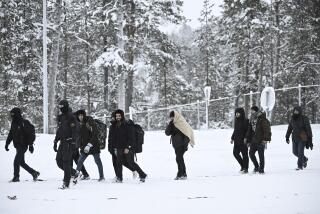Coalition to Close Most of Iraq’s Border With Iran
- Share via
BAGHDAD — All but three of Iraq’s 19 border crossings with Iran will be closed in an effort to reduce the number of foreign fighters entering the country, officials of the U.S.-led coalition said Saturday.
The closures are the first step in establishing firmer control over who enters Iraq, said L. Paul Bremer III, administrator of the Coalition Provisional Authority.
Officials said that Syria, which is also believed to be providing foreign insurgents access to Iraq, is next on the list.
“Foreign terrorists are present in Iraq,” Bremer said. “The numbers are not known with precision, but the recent attacks and their continuing presence underscores the importance of improving security at Iraq’s borders.”
Meanwhile, in Baghdad, a store owner was killed Saturday and several people were wounded when a bomb exploded at a women’s apparel shop in a busy commercial district.
In Washington, a Bush administration spokeswoman confirmed that a senior White House official was being dispatched to Iraq to help form its interim government as occupation officials prepare to return sovereignty at midyear.
The spokeswoman said the White House was not releasing the official’s name or exact arrival date for security reasons. In Baghdad, coalition spokesman Dan Senor identified the official as deputy national security advisor Robert D. Blackwill, who has made several visits to Iraq, Associated Press reported.
Along with the border closures, sophisticated security procedures will be put in place to catalog and track every person entering Iraq through the three remaining crossings with Iran. Also, the number of border guards will be doubled to 16,000.
Bremer acknowledged the difficulties of staunching the flow of Iranians and others across the long border, with its rugged desert and mountain terrain. However, “we owe this to the Iraqi people,” he added.
Senor said that Congress recently appropriated $300 million to shore up Iraq’s borders and that half the funds would be spent on equipment. The U.S. will spend $4.5 million to upgrade facilities at the three crossings, which have been the busiest along the border. He said several of the crossings that are being closed had fallen into disrepair in recent years.
Asked why tightening the controls took as long as it did, Senor said the coalition initially wanted to encourage the intermingling of Shiite Muslims from Iraq and Iran after the ouster of President Saddam Hussein’s regime.
He also said Iraqi officials were trying to persuade the Iranian government to be stricter with its emigration procedures.
However, the border remains virtually open in the south, and coalition officials said action was needed there.
“The Iranians must do more to discourage ... undesirables from illegally crossing the border,” Senor said. “It’s important to send a very clear signal to countries bordering Iraq that enough is enough.”
Brig. Gen. Mark Kimmitt, the coalition’s military spokesman, said the expansion of the border patrol force did not mean the number of coalition troops would be reduced. He said all countries bordering Iraq -- Iran, Turkey, Kuwait, Syria, Jordan and Saudi Arabia -- would eventually be addressed.
“This policy will apply to all of Iraq’s borders, but it is a multi-phase program,” Kimmitt said. “The first will be Iran. The second will be Syria.”
In the latest of the attacks that occur almost daily in Baghdad, a powerful bomb exploded Saturday in a shop selling women’s apparel and sewing accessories.
Neighbors and other shopkeepers identified the slain owner as Haydar Qizweeni, 58, a fixture in the bustling Karada neighborhood.
“This man has no relation whatsoever to politics,” said Mohammed Musawi, owner of a nearby cellular telephone shop who was slightly wounded by flying glass. “He is a religious man who has no relation to politics. He was just back from the mosque and was about to have his lunch.”
Qizweeni, however, was known to be a relative of Ibrahim Jafari, a member of the U.S.-appointed Iraqi Governing Council and a leader of the Dawa Party, a leading Shiite Muslim political force.
The major sects of Islam are increasingly at odds in occupied Iraq. In the last week, attackers staged apparent tit-for-tat attacks at Shiite and Sunni mosques in Baghdad, suggesting that tensions between the sects are on the rise.
Witnesses said they saw a bearded man carrying a bag go into Qizweeni’s shop shortly after midday. He departed without the bag, they said, and drove off just as the store exploded.
At the time, the shop owner was the only person inside, witnesses said. Those injured were outside, including two people in an apartment building across the street.
*
Researcher Suheil Ahmed contributed to this report.
More to Read
Sign up for Essential California
The most important California stories and recommendations in your inbox every morning.
You may occasionally receive promotional content from the Los Angeles Times.










